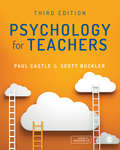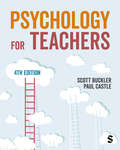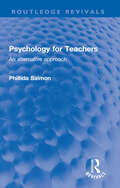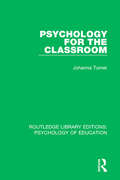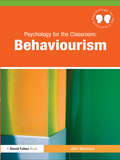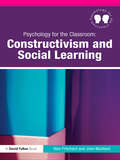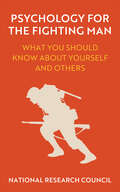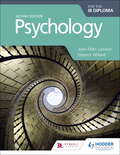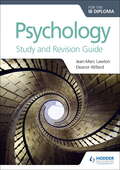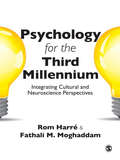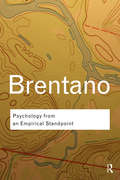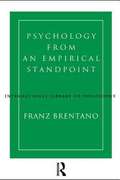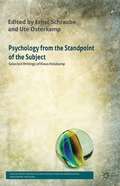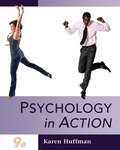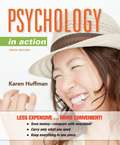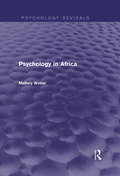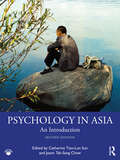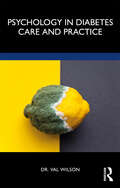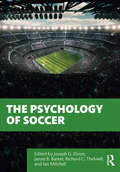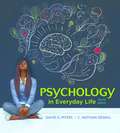- Table View
- List View
Psychology for Teachers
by Scott Buckler Paul CastleHow can ideas and concepts from psychology be applied smartly to the classroom to meet the needs of different learners? Supported by research and an awareness of the factors underpinning high-quality teaching, this book encourages teachers, and those training to teach, to examine their own methods in order to develop as confident, evidence-informed professionals. This third edition includes: · A new chapter on the psychology of elearning · A new discussion of applied cognitive theories in the classroom · The use of internationally friendly terminology throughout the book · Some streamlining of content to offer a more cohesive reading experience
Psychology for Teachers
by Scott Buckler Paul CastleThis is an essential textbook for teachers and those training to teach on applying research from psychology to education. It offers practical advice on ‘what works’ in the classroom. Not only will you understand how to teach effectively but also why, with explanations deeply rooted in theory and practice. Brimming with references to popular culture and packed with a range of tips, tasks, case studies and critical points, this book will keep you informed and intrigued in equal measure. This fourth edition includes: Significant updates to content on cognitive psychology and educational neuroscience; neurodivergence and special educational needs; and supporting mental wellbeing. Condensed and reworked chapters with a stronger focus on practical application in the classroom. Classroom examples described in universal terms to support teachers anywhere in the world.
Psychology for Teachers
by Scott Buckler Paul CastleThis is an essential textbook for teachers and those training to teach on applying research from psychology to education. It offers practical advice on ‘what works’ in the classroom. Not only will you understand how to teach effectively but also why, with explanations deeply rooted in theory and practice. Brimming with references to popular culture and packed with a range of tips, tasks, case studies and critical points, this book will keep you informed and intrigued in equal measure. This fourth edition includes: Significant updates to content on cognitive psychology and educational neuroscience; neurodivergence and special educational needs; and supporting mental wellbeing. Condensed and reworked chapters with a stronger focus on practical application in the classroom. Classroom examples described in universal terms to support teachers anywhere in the world.
Psychology for Teachers: An alternative approach (Routledge Revivals)
by Phillida SalmonFirst published in 1988, Psychology for Teachers offers a new approach to the study of the psychology of education. In contrast to many traditional texts, in which measurement is overemphasized and the individual tends to disappear in generalizations, this accessible book stresses the importance of both the individual and the process of learning and considers all aspects of schooling from the viewpoint of the person- whether teacher or pupil. Phillida Salmon provides a profile of the learning classroom through detailed case studies and examples. Her thesis will find an immediate response with all those who work in education. Psychology for Teachers offers both to those in training and in the classroom, and to those who work with them, a new and helpful way of engaging with the challenge of education and invites them to consider from a fresh viewpoint, some critical issues in schooling.
Psychology for the Classroom (Routledge Library Editions: Psychology of Education)
by Johanna TurnerOriginally published in 1977, Psychology for the Classroom is offered as an aid to people who are learning themselves and helping other people to learn: that is, to parents, students and particularly to teachers. The activity of teaching, to be successful, requires the teacher to understand the behaviour of the learner as fully as possible. Some of the insights into human behaviour gained by psychologists may prove helpful to the teacher in complementing his or her experience and intuitive understanding, and it is with this in mind that the topics covered in this book have been selected. Section one deals with cognitive aspects, an understanding of which his essential since cognitive processes are the means by which individuals are able to make sense of their environment. Section two considers the social situation in which knowledge and understanding develop, i.e. the way in which social interaction affects learning. Section three focuses on the individual, stressing that academic achievement depends not only on hard work but is intimately related to an individual’s personal development and personality. The book will be valuable to psychology students, student teachers and teachers on in-service courses, for its coverage of relevant psychological research and the description of pertinent experiments and studies of the time. Its originality lies in the way in which it communicates the importance of teachers using psychology as a basis for forming hypotheses which they can test for themselves – not necessarily as researchers, but in a mood of personal exploration.
Psychology for the Classroom: Behaviourism
by John WoollardPsychology for the Classroom: Behaviourism describes and reflects upon the foundations of behaviourism and the proliferation of behaviourist techniques in common practice today. Through examples drawn from research, presentation of theory, description of pedagogy and illustration by vignette, the book informs teachers and allows them to modify their teaching in order to take account of what is now known about the way that carefully planned curriculum and appropriately reinforced behaviours lead to learning. There is a particular emphasis upon the role of the traditional principles of behaviourist learning theory and practice to contemporary issues and strategies in e-learning. The author has taken a broad sweep of what has been written and promoted to educators in the area of behaviourist theory and practice, and the result is an informative and potentially very useful guide which should be read by all of us who are interested in, or responsible for, planning and encouraging effective teaching and learning.
Psychology for the Classroom: Constructivism and Social Learning
by Alan Pritchard John WoollardPsychology for the Classroom: Constructivism and Social Learning provides a lively introduction to the much debated topics of talk and group collaboration in classrooms, and the development of interactive approaches to teaching. The authors provide a background to research in constructivist and social learning theory, offering a broad and practical analysis which focuses on contemporary issues and strategies, including the use of e-learning and multimedia. Throughout the book theory is linked with its practical implications for everyday teaching and learning and chapters incorporate: the history of constructivist and social learning theory and key thinkers pedagogical implications practical strategies for the classroom constructivist theory and e-learning. Case studies and vignettes demonstrating best practice are used throughout the text, illustrating how monitored collaboration between learners can result in an effective learning environment where targets are met. Essential reading for practising teachers and students, this book is a valuable guide for those looking to provide effective teaching and learning within a constructivist framework.
Psychology for the Fighting Man: What You Should Know About Yourself and Others
by National Research CouncilUnleash the power of the mind in the crucible of war! In the depths of World War II, a groundbreaking endeavor emerged to provide the average American soldier with an accessible glimpse into the realm empirically grounded, scientific psychology. This transformative work, crafted with precision, aimed to empower every soldier who delved into its pages, unveiling the secrets to comprehending and harnessing their own intricate human responses—the elusive weaponry that holds the key to triumph on the battlefield. Prepare to revolutionize your understanding and utilization of the most enigmatic "instrumentalities of war," the human mind.
Psychology for the IB Diploma Second edition
by Eleanor Willard Jean-Marc LawtonEverything you need to navigate the IB Diploma Psychology course; ensure full coverage of the syllabus with a comprehensive guide to all the concepts, theories and research into approaches to understanding behaviour, presented with a cross-cultural focus for global thinkers. · Develop critical analysis skills with critical thinking boxes to draw out methodological issues from studies, and the TOK feature to help you recognise debates and issues.· Apply new skills and knowledge to everyday life with examples and case studies. · Navigate your way seamlessly through the course with key studies and terms highlighted.· Assess your progress and learning with summaries at the end of each chapter.
Psychology for the IB Diploma Second edition
by Eleanor Willard Jean-Marc LawtonExam board: International BaccalaureateLevel: IB DiplomaSubject: PsychologyFirst teaching: September 2017First exams: Summer 2019Everything you need to navigate the IB Diploma Psychology course; ensure full coverage of the syllabus with a comprehensive guide to all the concepts, theories and research into approaches to understanding behaviour, presented with a cross-cultural focus for global thinkers. · Develop critical analysis skills with critical thinking boxes to draw out methodological issues from studies, and the TOK feature to help you recognise debates and issues.· Apply new skills and knowledge to everyday life with examples and case studies. · Navigate your way seamlessly through the course with key studies and terms highlighted.· Assess your progress and learning with summaries at the end of each chapter.
Psychology for the IB Diploma Study and Revision Guide
by Eleanor Willard Jean-Marc LawtonExam board: International BaccalaureateLevel: IB DiplomaSubject: PsychologyFirst teaching: September 2017First exams: Summer 2019Encourage students to achieve their best grade by simplifying and focussing exam preparation with full syllabus coverage, practical exam tips and practice questions. · Ensure thorough exam preparation with full coverage of the syllabus including concise revision notes and clear explanations of the requirements and topics. · Focus on related vocabulary with key terms highlighted for each topic/sub-topic.· Give examples of what is required to achieve the best grades with examiner advice and tips, including the common mistakes to avoid.· Reinforce understanding and consolidate learning and exam focus with Exam Practice Questions.
Psychology for the IB Diploma Study and Revision Guide
by Eleanor Willard Jean-Marc LawtonExam board: International BaccalaureateLevel: IB DiplomaSubject: PsychologyFirst teaching: September 2017First exams: Summer 2019Encourage students to achieve their best grade by simplifying and focussing exam preparation with full syllabus coverage, practical exam tips and practice questions. · Ensure thorough exam preparation with full coverage of the syllabus including concise revision notes and clear explanations of the requirements and topics. · Focus on related vocabulary with key terms highlighted for each topic/sub-topic.· Give examples of what is required to achieve the best grades with examiner advice and tips, including the common mistakes to avoid.· Reinforce understanding and consolidate learning and exam focus with Exam Practice Questions.
Psychology for the Third Millennium: Integrating Cultural and Neuroscience Perspectives
by Rom Harré Fathali MoghaddamAs the 21st Century opened, the discipline of psychology seemed to be separating into two radically distinct domains. Qualitative and Cultural Psychology focused on the discursive means for the management of meaning in a world of norms, while Neuropsychology and Neuroscience focused on the investigation of brain processes. These two domains can be reconciled in a hybrid science that brings them together into a synthesis more powerful than anything psychologists have achieved before. For the first time, there is the possibility of a general psychology in which the biological and the cultural aspects of human life coalesce into a unitas multiplex, unity in diversity. This textbook ambitiously aims to and succeeds in providing this unity. Fathali M. Moghaddam and Rom Harré have designed a textbook brought together with additional voices that speak to the similarities and differences of these two seemingly distinctive domains. This bridge-building will encourage a new generation of undergraduate students studying psychology to more fully appreciate the real potential for the study of human behaviour, and as such it will represent a more provocative alternative to standard general psychology textbooks. It also support teaching in a host of courses, namely 2nd and 3rd courses on the conceptual and philosophical nature of psychology, social psychology, critical psychology and cognitive science. Selectively, it will also represent a very interesting and different choice for foundation level students too.
Psychology from An Empirical Standpoint
by Franz BrentanoFranz Brentano is one of the founding fathers of twentieth century philosophy, celebrated for introducing the concept of intentionality to philosophy as well as making significant contributions to ethics and logic. His work exerted great influence on major philosophers such as Edmund Husserl, but also philosophers travelling in the opposite direction, such Gottlob Frege. He counted Sigmund Freud amongst his students and Freud expressed great admiration for his teacher in several letters. Psychology from an Empirical Standpoint is Brentano’s most important and brilliant work. It helped to establish psychology as a scientific discipline, but did so in a highly original and distinctive manner by arguing for a form of introspectionism.? Brentano argued that consciousness is always unified and that the hallmark of the mind is that one’s thoughts are always directed towards something – his famous theory of ‘intentionality’ – arguments that have deep implications not just for philosophy but psychology, cognitive science and consciousness studies. With a new foreword by Tim Crane.
Psychology from an Empirical Standpoint
by Franz BrentanoFranz Brentano's classic study Psychology from an Empirical Standpoint was the most important of Brentano's works to be published in his lifetime.The author is able to show how Brentano has emerged since the 1970s as a key figure in both contemporary European and Anglo-American traditions and crucial to any understanding the recent history of philosophy and psychology. Edited by Oskar Kraus and translated by Linda L. McAlister.
Psychology from the Standpoint of the Subject
by Ernst Schraube Ute OsterkampThis book introduces the groundbreaking work of the German critical psychologist Klaus Holzkamp. In contrast to contemporary psychology's worldlessness, the writings present a concept of psychology based on the individual's relations to the world and open up new perspectives on human subjectivity, agency and the conduct of everyday life.
Psychology in Action
by Karen HuffmanIn this textbook, Huffman (Palomar College) introduces students to the basic foundations of psychology by incorporating life applications and active learning. This edition, which focuses on the theme of living better, has new sections with new and expanded coverage of how to live better at home, work, or school, in relationships, and in the world. It has additional applications, two optional chapters on industrial/organizational psychology and psychology in a global economy, a focus on visual learning and American Psychological Association-linked learning objectives, and expanded gender and cultural diversity and critical thinking/active learning exercises. Online access to the full text and other features is included. Annotation ©2010 Book News, Inc. , Portland, OR (booknews. com)
Psychology in Action (9th Edition)
by Karen HuffmanHuffman (Palomar College) introduces students to the basic foundations of psychology by incorporating life applications and active learning. This edition, which focuses on the theme of living better, has new sections with new and expanded coverage of how to live better at home, work, or school, in relationships, and in the world. It has additional applications, two optional chapters on industrial/organizational psychology and psychology in a global economy, a focus on visual learning and American Psychological Association-linked learning objectives, and expanded gender and cultural diversity and critical thinking/active learning exercises. Online access to the full text and other features is included.
Psychology in Action 10th Edition
by Karen HuffmanThis flagship book's 10th edition helps students examine their own personal studying and learning styles with several new pedagogical aids -- encouraging students to apply what they are learning to their everyday lives.
Psychology in Africa (Psychology Revivals)
by Mallory WoberIt is now well over a hundred and fifty years since the first celebrated geographical explorations of Africa took place. However, it was many years before there began quests of a different kind – the investigation of behaviour, personality, attitude and ability among Africa’s people. Originally published in 1975, this book is an account of that work: the first explorations in Africa of psychology. In an exhaustive and well-documented report the author, a psychologist who had himself done research in Nigeria, Uganda and who had lectured at Makerere University, drew together the main threads of the research carried out so far, putting the issues in an African perspective but anchoring them firmly within the framework of modern psychological thinking and technique of the time. Are there any common personality and intellectual characteristics among Africans? How does weaning affect African child development? How have Africans’ feelings developed about city life and industrial work? The questions the author considers range from the broad-based to the specific. The challenges which lay ahead for African investigators then moving into the mainstream of the work are also discussed. But perhaps above all the book made a convincing case for psychology becoming a relevant and finely honed discipline in Black Africa, characterised by practical application to Black African society. Each chapter covers a defined area of modern psychology of the time and presents a comprehensive survey in a language no more technical that the subject warrants. At the time is was felt this book would be invaluable to students of Africa secondary education whose course included a psychology component and to African students beginning a degree course in psychology. It would also have provided an informative supplement to courses in medicine, development studies, political science, sociology and anthropology.
Psychology in Asia: An Introduction
by Catherine Tien-Lun Sun Jason Tak-Sang ChowPsychology in Asia: An Introduction is the second edition of this introductory level textbook on psychology and human behavior written with an Asian focus.The book introduces the central tenets of psychology, using examples and content which are culturally relevant and applicable to students in Asia. It covers essential topics of psychology including: personality, human development, psychological disorders, gender and sexuality, emotion, and positive psychology. Each chapter is accompanied by information relevant to an Asian cultural context and connected to the region’s diverse heritage and history. For this second edition, the content has been substantially updated. In addition to standard topics found in texts on introductory psychology, this book includes chapters on the Tenets of Asian Psychology, Asian Philosophies, and Behavior.The text includes features to help students familiarize themselves with the key terms that are defined in the page margins. It includes learning aids such as boxes that define theoretical and technical terms, and the activities in each chapter encourage active learning and critical thinking. The authors also provide useful resources such as study questions, chapter outlines, and references to journal articles that allow further reading. Students will benefit from an increased understanding of the concepts taught through the authors' user-friendly academic writing style and colorful illustrations included throughout each chapter.Through this accessible text, undergraduate and upper undergraduate students of psychology will learn about core topics and classical studies that originate in the West but do so alongside the important contributions that Asian psychology makes to the field.
Psychology in Diabetes Care and Practice
by Val WilsonThis is an indispensable guide to diabetes care and practice, providing a thorough overview of the main issues that health professionals should keep in mind when treating someone with the condition, and how psychology plays a key role in diabetes self-management. Based on the latest research evidence along with numerous patient perspectives, the book looks at a wide range of topics in diabetes health psychology, from mental health conditions to theories of behaviour change, with a focus on comorbidities. Chapters describe the emotional impact of a diabetes diagnosis; the psychosocial issues surrounding living with diabetes; theories of behaviour applied to diabetes self-management; the impact of diabetes and depression; diabetes and eating disorders; the psychological impact of diabetes complications, and potential stigma associated with having Type 2 diabetes, including the psychological impact of weight loss surgery. Psychology in Diabetes Care and Practice enables the provision of support to reduce psychological distress and improve diabetes self-management. It helps patients to learn more about how best to manage their condition, as well as health professionals wanting to find appropriate ways to facilitate self-management.
Psychology in Elite Soccer: More Than Just a Game
by Joseph G. DixonSports psychology; exploring the effects of psychological interventions on important performance-related outcomes, has become ever more popular and prevalent within elite level soccer clubs in the past decade as teams look to gain psychological as well as physiological advantages over their competitors. Psychology in Elite Soccer; More Than Just a Game seeks to present ta detailed understanding of the theories underpinning the psychological issues relating to soccer along with practical insights into effective psychological interventions and strategies This book uses contemporary theory and research to elucidate key concepts and applied interventions and will include world-leading expert commentaries of contemporary theoretical and applied approaches in understanding critical issues in soccer along with providing practical implications and insights into working effectively in soccer-related contexts. Psychology in Elite Soccer; More Than Just a Game is an evidence-based resource to guide research and facilitate practice and will be a vital resource for researchers, practitioners and coaches within the area of sport psychology and related disciplines.
Psychology in Everyday Life
by David Myers C. DeWallGet the brief book that speaks to all students regardless of their background or level of preparedness. This, more than any other Myers/DeWall text, acknowledges the diversity of student readers. On these pages, you will find no assumptions about: Gender Culture Economic Background Education Physical Abilities Life Experiences Relationship or Family Status Plus, this edition is heavily updated to reflect the latest in psychological science and to further emphasize the value of applying psychology to everyday life.
